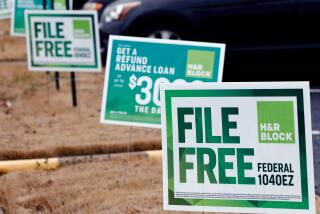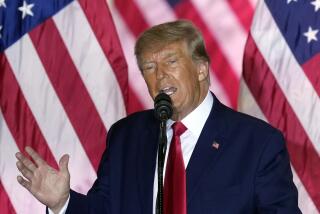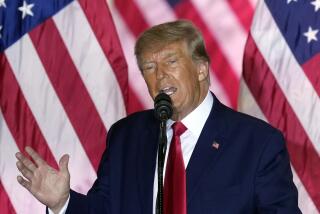$1.3-billion tax-shelter scam alleged
- Share via
SEATTLE — Two principals of defunct Seattle investment management firm Quellos Group and a Los Angeles lawyer were indicted in a tax shelter scheme that allegedly created more than $1.3 billion in fraudulent losses for prominent clients, including media mogul and billionaire investor Haim Saban.
The operation was “one of the largest tax fraud schemes ever uncovered in this country,” U.S. Atty. Jeffrey C. Sullivan in Seattle said Thursday.
Saban and four other clients were apparently unaware of the alleged fraud, having been offered written legal opinions from well-known law firms and assurances from their own tax attorneys that the tax shelter was legal. They paid about $400 million in back taxes, plus penalties, and were not accused of any wrongdoing.
The indictment names as defendants Los Angeles lawyer Matthew G. Krane, Quellos founder and Chief Executive Jeffrey Greenstein and Quellos principal Charles Wilk, also a lawyer. It charges the two former Quellos principals with conspiracy to defraud the Internal Revenue Service, tax evasion and money laundering, among other charges.
Krane, charged with money laundering, is accused of secretly receiving a $36-million kickback for enticing Saban, one of his long-standing Los Angeles clients, to funnel the bulk of more than $1 billion in proceeds from the sale of Fox Family Worldwide Inc. into money-losing investment vehicles, which Saban had been repeatedly assured were legal as a tax shelter.
Greenstein and Wilk are accused of setting up a complex series of sham transactions through a shell company on the Isle of Man to blend wealthy investors’ earnings with an equal number of stock losses to avoid owing capital gains taxes. But, the indictment alleges, the losing stocks didn’t exist, the company that supposedly acquired the stocks had neither employees nor earnings and the blended investment vehicles were a fraud. The two men “misled some of this country’s wealthiest citizens to commit tax fraud,” Sullivan said.
Quellos was once one of the world’s largest managers of mutual funds made up of hedge funds. The company sold its fund of funds business to New York asset manager BlackRock for $1.7 billion in 2007, and the remainder of the company closed. Prosecutors said the portion of the business sold to BlackRock had no connection to the transactions outlined in the indictment.
Greenstein, who co-founded Quellos in 1994, has repeatedly denied any wrongdoing, and his lawyers, in a joint statement, pointed to government investigators’ acknowledgment that the transactions were a “discrete and minor area” of Quellos’ business.
“The government has unfortunately chosen to bring these charges based on complex transactions that were executed approximately nine years ago,” the statement said. “These transactions were vetted by world-class professionals, including numerous tax experts upon whom Mr. Greenstein -- who is not a tax professional -- relied in his role as CEO of Quellos.”
Another prominent investor caught up in the scheme, according to Senate investigators, was Robert Wood Johnson IV, owner of the New York Jets and heir to the Johnson & Johnson fortune.
The 2006 tax return filed by Bill and Hillary Clinton showed that the couple had an interest in Quellos Alpha Engine, an investment fund headquartered in the Cayman Islands and run by Quellos Group. But that investment was not alleged to be part of the tax shelter included in the indictment. Secretary of State Hillary Clinton’s campaign spokesman told reporters that the investment was made through the Clintons’ blind trust and that the couple was not aware of it.
Mark Bartlett, Sullivan’s top assistant prosecutor, said Greenstein and Wilk created a portfolio of technology stocks demonstrating $9.6 billion in losses and provided documentation to investors and the IRS to make it appear that the losses were genuine.
“It would be impossible to show that any of the taxpayers had knowledge that this was a criminal scheme,” Bartlett said. “What the evidence has shown is the lies that were told to the IRS were also told to the taxpayer, and also told to attorneys for the taxpayers.”
The assurances included written tax opinions from prominent law firms, including Cravath, Swaine & Moore of New York, the second-oldest law firm in the U.S., and Bryan Cave, an international firm that specializes in corporate transactions. The documents affirmed it was “more likely than not” that the Quellos plan would produce favorable tax consequences, according to a 2006 investigation by the U.S. Senate’s permanent subcommittee on investigations, which turned the case over to federal criminal authorities.
The committee said Bryan Cave made more than $1 million in fees but disavowed knowledge of how the paper portfolio was formed. The Cravath Swaine partner who endorsed the Quellos transactions made $125,000 in fees and also said he was unaware of any fake trades.
Federal tax authorities have faced an increasingly difficult paper trail in recent years tracking earnings and potential tax liability in a global economy in which multinational companies have the opportunity to earn money and pay taxes in various jurisdictions -- many of them with tight bank secrecy laws, little or no income tax and strict asset protection laws.
Federal investigators in 2006 estimated that tax havens cost the U.S. Treasury about $40 billion to $70 billion a year.
Although most of the capital gains covered in the Quellos case occurred in 2000 and 2001, prosecutors said the investigation took years to document, in part, because of difficulty penetrating Austria’s strong bank secrecy laws to gain access to Krane’s banking records.
“You’re dealing with foreign governments, foreign jurisdictions, all the records that the two agents have to pile through. . . . It could take years, because everything has to come through official channels,” said Kenneth Hines, special agent in charge of the IRS in Seattle.
The indictment accuses the two former Quellos principals of conspiracy to defraud the IRS, tax evasion and money laundering, among other charges.
Krane is in custody in Los Angeles on separate federal passport fraud charges.
--
More to Read
Inside the business of entertainment
The Wide Shot brings you news, analysis and insights on everything from streaming wars to production — and what it all means for the future.
You may occasionally receive promotional content from the Los Angeles Times.










